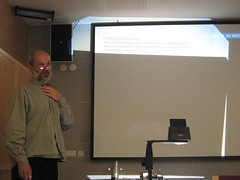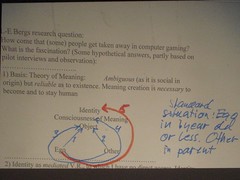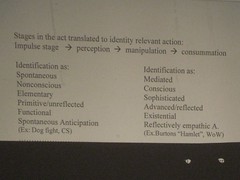Freefrom notes from GamesInAction Conference in Gothenburg 14th of May.
Lars Erik Berg: Stages of Identification in Computer Games.
Games giving a new … for identity formation
Stages of the identification process, not referring to stages in development psychology.
1.
People meeting each other are always playing roles.
Goffman.
The make believe process works more swiftly on screen.
2.
“you believe yourself on the screen”. If you believe that you are a poet. Liquid poetry in mind. Not yet cristallysed. Then some handwriting. Creates a distance, a degree of objectification. In the process the to the final work, the poet, it becomes more and more objectified. Externalised. First it was me, then it is outside me.
Similar to playing WoW: Many ppl tell stories about this.
3.
Sherry Turkle: Virtual reality more real than reality itself. From the point of view of identity there is an enormous amount of quotes stating the same.
4. “Life gets more intensive at the screen”. (Abstract Life??). Problematic usage?
Berg: as an identity psychologist…. To Asplund abstract sociality is something dangerous. PPl abstracted from each other.
Infant-mother = very concrete. //yes, plus THAT is very very rare as fictional theme in games.
Berg sceptical to Asplund in this respect. This abstract sociality is more conserned with bureaucratic life rather than virtual life. Berg does not agree on the danger with Asplund.
How come that something seemingly so stable as ones identity can be so fragile, so floating?
- new slide.
Meaning is ambiguous.
Mening not created in the mind of _one_ human being. There need to be at least two. Rely on meanings. What we do is dependent on our capacity of creating meaning, else we go insane. Derstoying meaning has been used as mental torture, breaking people down.
- 3 month baby (in figure)
- the parent.
- other reacts to ego’s reaction to the object. This is observed by ego. Which is number 4
- and this is the process of meaning. The others response to egos action to the object.
One can never se oneself directly. One can see the char. But for oneself. Need someone else to see one. The own identity – impossible to have direct access to it. But you have acess to others reacting to you “It is nice to see you smile”. There is NO concrete reality in the object which is identity. There is only virtual reality. This is a general and sustainable explanation, but on a general level of course.
Identity is a totally virtual reality object.
Identity a as representation of the _reflected_action where material reality (and concrete sociality) is gone.
.. the mashine is usable only if you have software. And what is this but what the “other”. Another language. Universal language.
The other invisible for you. Interesting process in identity psychology.
Now Berg is trying to …. The paper … (which are on the web)
Act. George Mead.
Impulse -> perception -> manipulation -> consummation
Identity growing from the reflected individuality. Going on _all the time_.
- new picture on OH
to left the more primitive to right more sophisticated, in the picture.
//oh that’s a new way to categorise games, looking at the level of sophistication in the identity formation.
Torril asks: what about games that are not computer games? How you consider that any came can carry away the player?
Berg: oh yes I did! Childen growing up – board games, rpg, woods etc, but computer games bring it furher:
T: soccer for exampla can be just as complicated
B: agree needs both empathy and intellingence.
More pictures from Berg's speech


